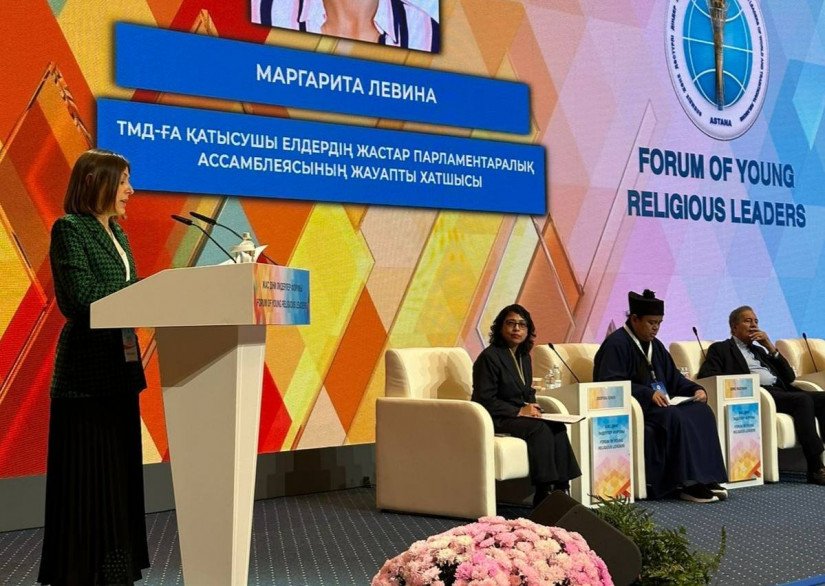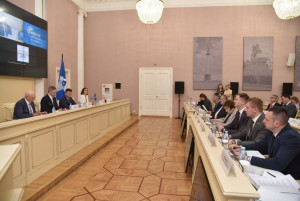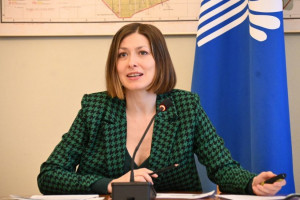Role of YIPA CIS in Preserving Spiritual Values Noted at Forum of Young Religious Leaders
09 October 2024

The First Forum of Young Religious Leaders “Forming a Common Future: The Role of Young Leaders in Strengthening Interreligious Dialogue” under the auspices of the Congress of Leaders of World and Traditional Religions was held today in Astana. Representatives of more than 30 countries of the world discussed ways of solving urgent problems of our time and outlined key areas of joint work.
Opening the forum, Speaker of the Senate of the Parliament of the Republic of Kazakhstan, Head of the Secretariat of the Congress of Leaders of World and Traditional Religions Maulen Ashimbayev read out the address of President of Kazakhstan Kassym-Jomart K. Tokayev to the participants of the meeting. The Head of the State emphasized that the active participation of young people living in different countries of the world in matters of religion had a direct impact on determining the spiritual future of mankind.
For his part, the Speaker of the Senate described the Forum as a unique platform for inter-religious dialogue among young leaders.
Maulen Ashimbayev outlined several key areas necessary for the qualitative realization of the potential of young leaders to shape a common future, including peace and security, climate change, digital cooperation, and other pressing tasks to build a just, stable and peaceful future.
Secretary-in-charge of the Youth Interparliamentary Assembly of the CIS Member Nations (YIPA CIS) Margarita Levina took part in the Forum and spoke at the section “Spiritual Values in the Era of Digitalization and Artificial Intelligence: Challenges and Opportunities”.
She informed that the YIPA CIS, established more than ten years ago, payed special attention in its work to youth policy, intercultural dialogue and spiritual values among young people.
According to the Secretary, digitalization opened up huge opportunities and helped to solve many problems: it improved the quality of life, speeded up access to information, simplifies communication, developed science, education and culture. An example was the media project of the YIPA CIS “Memory Lines”. Speakers of the national parliaments of the Commonwealth, young parliamentarians and youth representatives of the CIS countries read works from the war years, and the videos had been distributed through digital platforms and social networks. Thus, technology made it possible not only to preserve but also to popularize important spiritual values, such as the memory of past deeds and respect for history
However, according to Margarita Levina, digitalization also created challenges, such as the destruction of traditional forms of communication and the spread of misinformation. Young parliamentarians of the Commonwealth were trying to minimize the risks by sharing the experience of the CIS countries on cybersecurity of children and youth.
At the YIPA CIS meetings, the speaker added, participants developed recommendations on legislative regulation and implementation of significant projects to create a safe digital space, protecting young people from cyberbullying, manipulation and propaganda, while preserving access to knowledge and opportunities for self-realization.
In conclusion, Margarita Levina reported on the next meeting of the YIPA CIS, which would be held on 21-22 November in the Tavricheskiy Palace and would be dedicated to the Year of Volunteer Movement in the CIS. In addition, at this meeting the chairmanship of the YIPA CIS will pass to the Republic of Kazakhstan. She expressed confidence that this would give a new impetus to the development of the YIPA CIS and continue to strengthen the established traditions of intercultural interaction.
During breakout sessions, the Forum participants discussed the role of young leaders in the sustainable development of the world, in the dialogue of cultures and religions, as well as spiritual values in the era of digitalization and artificial intelligence.
At the end of the event, a final document – the Declaration of Young Religious Leaders – was announced, in which the participants noted the consolidating and constructive role of the first Forum, as well as expressed their willingness to direct their knowledge, energy and resources to build a world where mutual respect and harmony, mercy and compassion, mutual understanding and cooperation prevail.



